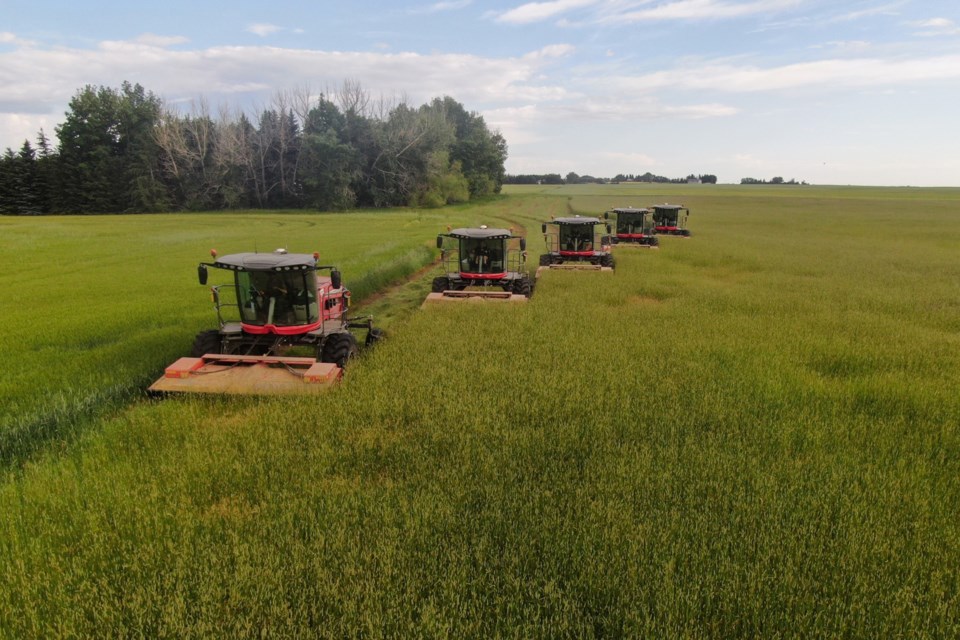MOUNTAIN VIEW COUNTY — As it dragged on, the recent railway work stoppage cost an Olds-area agricultural business thousands of dollars, its president says.
Trains began to trundle along the tracks of Canada's two major railways on Monday after the federal labour board ended a four-day work stoppage that snarled supply chains and upended commutes.
Amid a bitter labour dispute, the Canada Industrial Relations Board on Saturday ordered Canadian National Railway Co. and Canadian Pacific Kansas City Ltd. to resume operations and 9,300 workers to return to their posts at 12:01 a.m. ahead of binding arbitration set to begin this week.
The union representing both Canadian National Railway Co. (CN) and Canadian Pacific Kansas City (CPKC) workers, Teamsters Canada Rail Conference, said it will lawfully comply with the CIRB decision, adding it will also appeal the ruling to federal court.
By Thursday, Aug. 22, for the first time ever, with a looming strike at both major railway companies, the employers locked workers out.
CPKC workers went on strike at the same time the lockout came into effect Thursday.
As of Friday, CN employees were not yet in a legal strike position, but their union, The Teamsters, issued 72-hour strike notice that day.
CN trains began running on Friday morning after the union took down picket lines, but the crisis did not end. The Teamsters issued a 72-hour strike notice against CN.
In the case of CPCK, the lockout remained in place as the union challenged the order for binding arbitration.
The union has been demanding better wages and benefits for workers.
It says both railway companies want to loosen rules around rest periods and scheduling, which it says would create safety concerns.
The union also says CN wants to be able to move employees far from their homes for several months at a time to address labour shortages.
The union wants provisions to guard against those changes.
Businesses, farmers, ranchers and commuters across the country decried the economic damage the work stoppage was doing, so the federal government stepped in.
Barr-Ag Ltd., located in Mountain View County in the Olds area, handles and ships Canadian grain and hay to markets around the world. It has about 50 employees in Olds and area and another 10 or so in Calgary.
“I knew it wouldn't be over,” Barr-Ag president and owner Barry Schmitt told the Albertan during an interview on Friday.
“They’re not gonna go quietly, go back to work and accept everything.”
Schmitt said the work stoppage forced a halt to his business and that has cost the company thousands of dollars. He said it ships millions of dollars’ worth of product a year.
“We're shut down. No, production, which is frustrating,” he said, noting the company has delivery contracts for product that it hasn’t been able to move.
“We had to at night call our customers and apologize for Canada's inability to be a consistent supplier.
“You know what they said? ‘Didn't you guys just do this? Like, why have so many strikes in Canada?’”
Schmitt said the company urged his customers to be patient; that the work stoppage hopefully would soon be resolved.
“We're trying to explain to our customers, ‘please don't buy from the U.S., you know, wait, wait a little bit,” he said.
However, Schmitt is worried that shippers and customers won’t wait forever for Canadian product to get rolling on railways again.
“What normally happens is the vessels will wait a few days and then they'll just skip Vancouver and go to Seattle and back to China or Japan where they were going,” he said.
Schmitt worries how long it might be before those customers may come back to his company.
“We can handle a few days, but it's all of our bookings; all the momentum is gone now,” he said.
Schmitt said the “real damage” would occur if the work stoppage lasted for at least a couple of weeks.
“That's when our customers start buying products from other people; that the impact,” he said.
“We've been shipping to the same people for 25,30 years, so they're not running away yet. They will, if they continue.”
Schmitt said as of Friday, the company had not needed to lay any of its employees off. They were busy doing “major cleanup” of facilities and equipment repairs.
Crops are being harvested and straw is being baled as well.
Schmitt said the crops coming off are being bagged, a common practice to protect against insects animals and the elements.
“Bagging, it's an extra cost, but at least we have an option,” he said. “Grain bagging is quite normal now, so we'll just do that.
“But yeah, there's no other place to take it really, unless you borrow from a neighbour's business, but they're all using theirs as well anyway.”
- With files from Canadian Press



